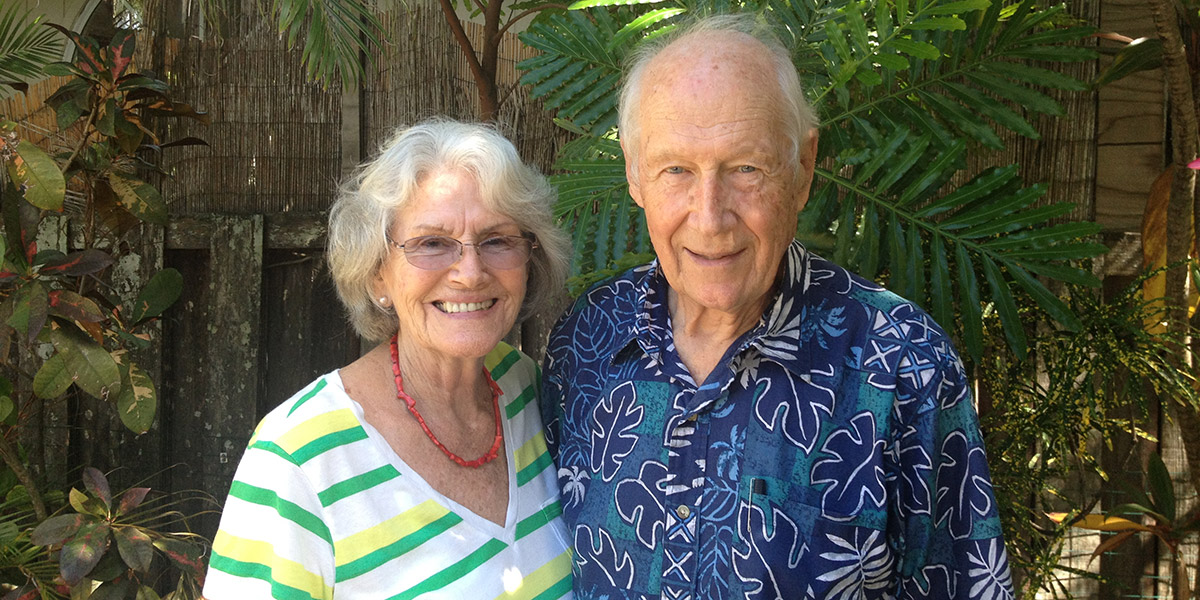Planning Ahead to Support the Next Generation
When considering a bequest...
Annette Mueller-Dombois has these suggestions for anyone considering a planned gift to the University of Hawai‘i Foundation:
- Think carefully about what you are doing. Do you need your resources yourself or not?
- What is your intention or passion? For example, Dieter wants students to continue his work.
- Does your family know about your intentions to make a gift? It's important that all are in agreement.
“Prof. Mueller-Dombois has contributed to our knowledge of Hawai‘i and the Pacific in profound and diverse ways. All of us who work in ecology, conservation, and/or resource management owe him a great deal; his work has been the foundation for much of what we have done. Even since his retirement more than 20 years ago he has continued to push himself and all of us into new areas of research and new ways of thinking.”
Stanford Ecologist Peter Vitousek and UH Mānoa Botanist Donald Drake in April 2012 issue of Pacific Science
UH Mānoa Emeritus Professor Dieter Mueller-Dombois has studied the ‘ōhi‘a forests of Hawai‘i for fifty years and, with his colleagues, was the first to identify ‘ōhi‘a forest dieback as not an outcome of pathogens or invasive species but a natural life cycle event of cohorts of trees that germinate, grow up, and die together on the same substrate. Their demise makes way for the next generation. This observation has received global recognition.
He counts both, this paradigm shift regarding forest diebacks and his graduate students, as his greatest professional accomplishments. He advised 18 students on their PhD dissertations and 17 on their MSc theses as well as 5 on their post-doctoral fellowships. Many of these scientists are leaders in the environmental ecology field today. He credits his success, in part, to imagination. "You have to think beyond factual relationships and have imagination to identify what is really interesting and then ask questions." The questions then can be developed into appropriate research hypotheses.
Born and raised in Germany, he knew as young as seven years old that he wanted to be a forester like his uncle. Before he could pursue that dream, he experienced the nightmare of WWII as a 17-year-old drafted into the German army. "When the war was over, I knew I would never go through anything as terrible as that again in my life."
Dieter's War ExperienceWhen he returned to UH in 1969, he had additional material for his college classes and would successfully institute a world-class plant ecology program during his tenure. Today, he is considered the foremost vegetation ecologist in the Pacific.
"Prof. Mueller-Dombois has contributed to our knowledge of Hawai'i and the Pacific in profound and diverse ways. All of us who work in ecology, conservation, and/or resource management owe him a great deal; his work has been the foundation for much of what we have done. Even since his retirement more than 20 years ago he has continued to push himself and all of us into new areas of research and new ways of thinking."
Stanford Ecologist Peter Vitousek and UH Mānoa Botanist Donald Drake in April 2012 issue of Pacific Science
His wife, Annette, is a teacher who comes from Germany as well. This is a second marriage for them both. They have seven children between them from their first marriages and many, many grandchildren and great-grandchildren. Annette is a committed partner in her husband's endeavors. In his latest book, Dieter acknowledges her "sustained and most valuable assistance."
Together, they have made a bequest to the University of Hawai‘i. The Dieter and Annette Mueller-Dombois Endowed Fellowship will be established from a portion of their estate. As stated in the gift agreement, this fellowship will fund "graduate or post-doctoral research at the University of Hawai‘i at Mānoa College of Natural Sciences, Department of Botany in the area of island ecosystems and vegetation ecology."
As Dieter explains, "The hope is that people will further work along the lines of biodiversity understanding particularly conservation ecology and ecosystem services with a focus on native resilience." What is the resiliency of native populations — in humans as well as plants and animals? What are the innate factors that different species and cultures contain that can help re-establish and maintain sustainable ecosystems? He also hopes that natural and social scientists will work together with others, sharing their findings to further the knowledge of all.
Having studied the life cycles of ‘ōhi‘a forests for decades, Dieter and his wife Annette are well aware of their own. As Dieter observes, "Aging is not a disease. It is the ultimate predisposition to completing a life cycle. Growing old is a challenge. It takes courage, self-discipline, and a sustained love of life with resilience to complete one's own life cycle." With this attitude, Dieter and Annette have chosen to provide for the generations to follow.
In the dedication of the April 2012 issue of Pacific Science, Peter Vitousek and Donald Drake hoped that the papers in the journal would "inspire others to study what Prof. Mueller-Dombois has accomplished, and to follow their own interests and convictions with the passion that he has displayed through his long and productive life."
May this fellowship accomplish the same end.
Questions? / More Information
If you would like to learn how you can support UH students and programs like this, please contact us at 808 376-7800 or send us a message.
